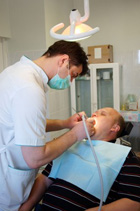The wheels on the bus go round and round in the city ofLeeds, pretty much like the blood flows around the body as well, round and round it goes supplying all of the vital organs that keep the system working. The body is such a delicate system, but while everything is working correctly, you will work correctly. One of the most important links to the body is the mouth- it’s the portal to your inside so what you put in it is important, but even more so is how you look after it. So many things can cascade out of control very quickly in your mouth so it is very important that you keep up with a strict regime of oral hygiene, coupled with regular visits to the dentist and there is a very good reason for this. You are trying to avoid severe situations such as gum disease and periodontal disease which superficially can cause your teeth to fall out it the long run. But by which time, below the surface, this will mean that you have been also poisoning your blood over a long period of time too. Gum disease releases toxins into the blood which inevitably deposit themselves into the heart and cause it to fail over time. Caring for your teeth and gums will ensure that you keep your bloodstream clean and free of such toxins and keep your heart healthy.







 Dental plaque is a soft bacterial deposit that forms on the surface area of your teeth. It is also referred to as dental biofilm. Some dental plaque can be removed by regular brushing and flossing, but without the added benefits of regular cleanings from your dentist, any dental plaque you missed on your own can harden into calculus, staining your teeth an embarrassing yellow. Calculus cannot be removed without a professional cleaning.
Dental plaque is a soft bacterial deposit that forms on the surface area of your teeth. It is also referred to as dental biofilm. Some dental plaque can be removed by regular brushing and flossing, but without the added benefits of regular cleanings from your dentist, any dental plaque you missed on your own can harden into calculus, staining your teeth an embarrassing yellow. Calculus cannot be removed without a professional cleaning. Given that periodontal disease can, in extreme cases, result in the loss of teeth, dentists agree that it is best to avoid it rather than to deal with the consequences. Periodontal disease is disease of the gums and it has a set of easy to understand causes and, as such, measures that we can all take to prevent it in the first place.
Given that periodontal disease can, in extreme cases, result in the loss of teeth, dentists agree that it is best to avoid it rather than to deal with the consequences. Periodontal disease is disease of the gums and it has a set of easy to understand causes and, as such, measures that we can all take to prevent it in the first place. Periodontal disease is a killer to teeth and gums and if left to roam the mouth at leisure, can leave you with no teeth at all, as well as other problems. If you live in the city of Leeds and are very casual about oral hygiene and dental check-ups, you are a prime candidate to get this disease, because without proper cleaning, plaque will develop and tartar will form around the teeth. Tartar can only be removed by a dentist, but if you don’t go to see your dentist, the problem will escalate to gum disease and tooth decay. Pockets will form between the gums and teeth and the roots can become infected. If your gums bleed, are sore or they swell up, then this is the first sign that you are suffering from periodontal disease and it will take a lot of work to rectify the problem involving some serious cleaning. The pockets will require deep scaling and the roots will require canal treatment to remove any decayed pulp from within. If the teeth are to be saved, depending on how advanced the disease is, gum tissue and bone grafting may be need to stop any further destruction to the mouth. What better reasons do you need to look after your teeth and catch these problems early on?
Periodontal disease is a killer to teeth and gums and if left to roam the mouth at leisure, can leave you with no teeth at all, as well as other problems. If you live in the city of Leeds and are very casual about oral hygiene and dental check-ups, you are a prime candidate to get this disease, because without proper cleaning, plaque will develop and tartar will form around the teeth. Tartar can only be removed by a dentist, but if you don’t go to see your dentist, the problem will escalate to gum disease and tooth decay. Pockets will form between the gums and teeth and the roots can become infected. If your gums bleed, are sore or they swell up, then this is the first sign that you are suffering from periodontal disease and it will take a lot of work to rectify the problem involving some serious cleaning. The pockets will require deep scaling and the roots will require canal treatment to remove any decayed pulp from within. If the teeth are to be saved, depending on how advanced the disease is, gum tissue and bone grafting may be need to stop any further destruction to the mouth. What better reasons do you need to look after your teeth and catch these problems early on? There are many good reasons to go and see your dentist every six months. If you have been recently then you will know about how they administer scaling and polishing to get rid of troublesome tartar and that they look out for signs of dental decay, oral cancer and sleep apnea. But your dentist is also keeping a close eye on the state of your gums. And thank goodness they are because gum disease actually causes more cases of tooth loss than decaying teeth themselves.
There are many good reasons to go and see your dentist every six months. If you have been recently then you will know about how they administer scaling and polishing to get rid of troublesome tartar and that they look out for signs of dental decay, oral cancer and sleep apnea. But your dentist is also keeping a close eye on the state of your gums. And thank goodness they are because gum disease actually causes more cases of tooth loss than decaying teeth themselves. Taking care of your teeth ought to go hand in hand with looking after your gums as well. The sad fact is that all too often gum problems go unnoticed and are actually a greater cause of tooth loss than dental decay itself. In conjunction with regular visits to your City of Leeds dentist, you should be able to recognise the signs of periodontal disease so that it can be treated before it gets worse.
Taking care of your teeth ought to go hand in hand with looking after your gums as well. The sad fact is that all too often gum problems go unnoticed and are actually a greater cause of tooth loss than dental decay itself. In conjunction with regular visits to your City of Leeds dentist, you should be able to recognise the signs of periodontal disease so that it can be treated before it gets worse. Periodontal or gum disease is a common problem that affects millions worldwide; it is best to get this disorder treated at the very beginning before it flares up and causes serious damage to your oral health. In addition, it can also affect your smile making you lose confidence and shy away from social gatherings. There are various ways by which you can effectively treat gum disease in Leeds.
Periodontal or gum disease is a common problem that affects millions worldwide; it is best to get this disorder treated at the very beginning before it flares up and causes serious damage to your oral health. In addition, it can also affect your smile making you lose confidence and shy away from social gatherings. There are various ways by which you can effectively treat gum disease in Leeds. Gum disease, also known as periodontal disease, is caused when bacteria build up to form a substance called plaque, which coats the gums and releases acids. These acids erode the gum tissue and begin to cause an irritation. If this problem is not treated or improved with more effective cleaning, it can soon develop into an infection and cause a variety of different dental health complications.
Gum disease, also known as periodontal disease, is caused when bacteria build up to form a substance called plaque, which coats the gums and releases acids. These acids erode the gum tissue and begin to cause an irritation. If this problem is not treated or improved with more effective cleaning, it can soon develop into an infection and cause a variety of different dental health complications. The two most common problems that affect the health of our teeth are tooth decay and gum disease. Tooth decay is when plaque acid has eroded the protective layer of enamel, exposing the more sensitive central part of the tooth to bacteria and infection. This can result in painful and unpleasant complications and expensive root canal and crown treatment. Most early decay is addressed by fillings, which most people will experience during their lifetime.
The two most common problems that affect the health of our teeth are tooth decay and gum disease. Tooth decay is when plaque acid has eroded the protective layer of enamel, exposing the more sensitive central part of the tooth to bacteria and infection. This can result in painful and unpleasant complications and expensive root canal and crown treatment. Most early decay is addressed by fillings, which most people will experience during their lifetime.

